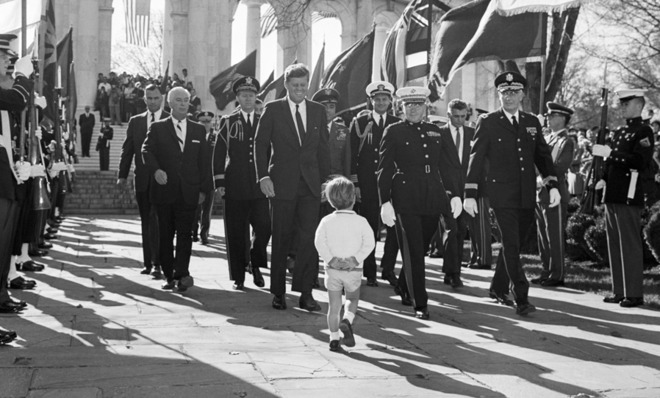Today in history: President Kennedy's eerie visit to Arlington National Cemetery
Eight months later, he was buried there

A free daily email with the biggest news stories of the day – and the best features from TheWeek.com
You are now subscribed
Your newsletter sign-up was successful

March 3, 1845: Congress overrode a presidential veto for the first time — an appropriations bill on John Tyler's last full day in office. It takes a two-thirds vote to override a presidential veto. Tyler had previously vetoed ten bills sent to him by Congress. The phrase "presidential veto" does not appear in the Constitution, by the way, but Article I requires that every bill, order, resolution, or other act of legislation by the Congress be presented to the president for his approval. The president can either sign it into law, return the bill to either the House or Senate with his objections to the bill (a veto), or neither sign nor return it to Congress after having been presented the bill for 10 days exempting Sundays (if Congress is still in session, the bill becomes a law; otherwise, the bill does not become a law and is considered a pocket veto).
March 3, 1931: President Hoover signed legislation designating "The Star-Spangled Banner" as the U.S. national anthem.
March 3, 1963: President John F. Kennedy, accompanied by his wife and a journalist friend, Charles Bartlett, toured Arlington National Cemetery. Surveying the sweeping vista of Washington from Lee Mansion and environs, the president remarked, "I could stay here forever." Eight months later, he would be buried near that same spot.
The Week
Escape your echo chamber. Get the facts behind the news, plus analysis from multiple perspectives.

Sign up for The Week's Free Newsletters
From our morning news briefing to a weekly Good News Newsletter, get the best of The Week delivered directly to your inbox.
From our morning news briefing to a weekly Good News Newsletter, get the best of The Week delivered directly to your inbox.
Quote of the Day
"It is just as important that business keep out of government as that government keep out of business." -Herbert Hoover
More from West Wing Reports...
- Latest analysis of 2016
- Presidents and the security/liberty debate
- Senate report on Benghazi point to failings
A free daily email with the biggest news stories of the day – and the best features from TheWeek.com
-
 What to know before filing your own taxes for the first time
What to know before filing your own taxes for the first timethe explainer Tackle this financial milestone with confidence
-
 The biggest box office flops of the 21st century
The biggest box office flops of the 21st centuryin depth Unnecessary remakes and turgid, expensive CGI-fests highlight this list of these most notorious box-office losers
-
 The 10 most infamous abductions in modern history
The 10 most infamous abductions in modern historyin depth The taking of Savannah Guthrie’s mother, Nancy, is the latest in a long string of high-profile kidnappings